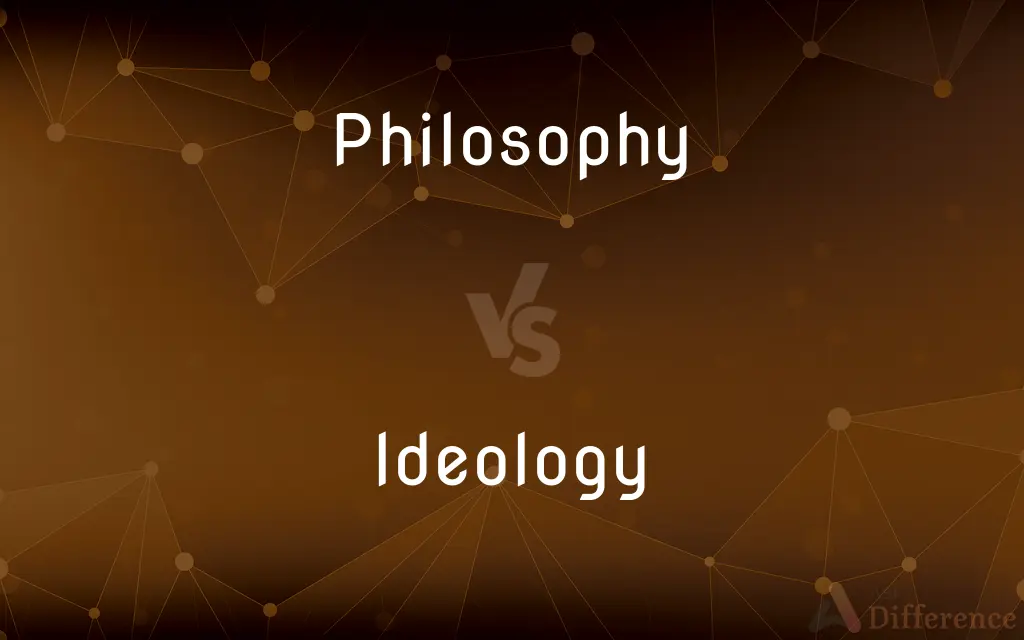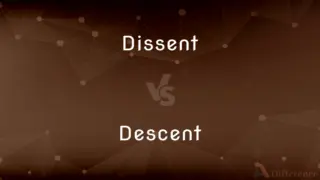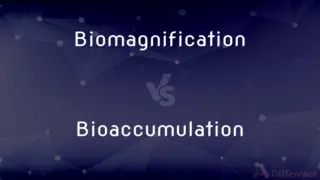Philosophy vs. Ideology — What's the Difference?
Edited by Tayyaba Rehman — By Fiza Rafique — Updated on October 1, 2023
Philosophy is the study of fundamental questions about existence, knowledge, and ethics. Ideology is a set of beliefs or principles guiding political, social, or economic actions.

Difference Between Philosophy and Ideology
Table of Contents
ADVERTISEMENT
Key Differences
Philosophy encompasses the study of general and fundamental problems related to matters such as existence, knowledge, values, reason, and more. Ideology, on the other hand, is more prescriptive, referring to a system of beliefs or principles, often related to political, social, or economic theories.
When one delves into Philosophy, they're often seeking to understand the underlying nature of reality, ethics, and existence without necessarily arriving at definitive answers. In contrast, Ideology tends to present a set of beliefs or principles as truths, often aiming at guiding or justifying certain actions or systems.
For instance, Philosophy might ponder the nature of justice, asking what it truly means for something to be just. Ideology, meanwhile, could present a specific view on what a just society should look like and how it should function. While Philosophy often remains open-ended, promoting critical thinking and debate, Ideology tends to advocate for a particular worldview or course of action.
Both Philosophy and Ideology have shaped human thought and civilizations. While Philosophy equips individuals with tools to think critically and explore profound questions, Ideology often drives collective action and shapes societal structures based on its prescribed beliefs.
Comparison Chart
Focus
Study of fundamental questions.
Set of beliefs guiding actions.
ADVERTISEMENT
Nature
Generally open-ended and explorative.
More prescriptive and definitive.
Goal
To understand underlying concepts without definitive conclusions.
To advocate for and implement a particular worldview.
Application
Broad areas like ethics, existence, and knowledge.
Specific areas like politics, economics, or societal structures.
Flexibility
Encourages critical thinking and debate.
Often presents beliefs as truths.
Compare with Definitions
Philosophy
The study of fundamental questions about existence, knowledge, and values.
His Philosophy class delved into the nature of reality.
Ideology
Doctrine, myth, or belief guiding an individual, institution, or class.
The company's Ideology centered around innovation.
Philosophy
A critical study of basic principles and concepts.
Philosophy challenges us to question our assumptions.
Ideology
A system of ideas that guides political, social, or economic actions.
The party's Ideology promotes environmental sustainability.
Philosophy
A system of beliefs or principles governing thought and action.
The company's Philosophy prioritizes customer satisfaction.
Ideology
A vision or manner of thinking characteristic of an individual or group.
The Ideology of the movement was rooted in equality.
Philosophy
Philosophy (from Greek: φιλοσοφία, philosophia, 'love of wisdom') is the study of general and fundamental questions, such as those about existence, reason, knowledge, values, mind, and language. Such questions are often posed as problems to be studied or resolved.
Ideology
A set of beliefs or principles held by a group or individual.
Her Ideology prioritizes community over individualism.
Philosophy
The study of the fundamental nature of knowledge, reality, and existence, especially when considered as an academic discipline.
Ideology
An ideology (/ˌʌɪdɪˈɒlədʒi/) is a set of beliefs or philosophies attributed to a person or group of persons, especially as held for reasons that are not purely epistemic, in which "practical elements are as prominent as theoretical ones." Formerly applied primarily to economic, political, or religious theories and policies, in a tradition going back to Karl Marx and Friedrich Engels, more recent use treats the term as mainly condemnatory.The term was coined by Antoine Destutt de Tracy, a French Enlightenment aristocrat and philosopher, who conceived it in 1796 as the "science of ideas" to develop a rational system of ideas to oppose the irrational impulses of the mob. In political science, the term is used in a descriptive sense to refer to political belief systems.
Philosophy
A theory or attitude that acts as a guiding principle for behaviour
Don't expect anything and you won't be disappointed, that's my philosophy
Ideology
A set of doctrines or beliefs that are shared by the members of a social group or that form the basis of a political, economic, or other system.
Philosophy
The study of the nature, causes, or principles of reality, knowledge, or values, based on logical reasoning.
Ideology
Doctrine, philosophy, body of beliefs or principles belonging to an individual or group.
A dictatorship bans things, that do not conform to its ideology, to secure its reign.
Philosophy
A system of thought based on or involving such study
The philosophy of Hume.
Ideology
(uncountable) The study of the origin and nature of ideas.
Philosophy
The study of the theoretical underpinnings of a particular field or discipline
The philosophy of history.
Ideology
The science of ideas.
Philosophy
An underlying theory or set of ideas relating to a particular field of activity or to life as a whole
An original philosophy of advertising.
An unusual philosophy of life.
Ideology
A theory of the origin of ideas which derives them exclusively from sensation.
Philosophy
The love of wisdom.
Ideology
A set or system of theories and beliefs held by an individual or group, especially about sociopolitical goals and methods to attain them; in common usage, ideology is such a set of beliefs so strongly held by their adherents as to cause them to ignore evidence against such beliefs, and thus fall into error - in this sense it is viewed as a negative trait; contrasted to pragmatism, and distinct from idealism.
Philosophy
(uncountable) An academic discipline that seeks truth through reasoning rather than empiricism.
Philosophy is often divided into five major branches: logic, metaphysics, epistemology, ethics and aesthetics.
Ideology
An orientation that characterizes the thinking of a group or nation
Philosophy
(countable) A comprehensive system of belief.
Ideology
Imaginary or visionary theorization
Philosophy
(countable) A view or outlook regarding fundamental principles underlying some domain.
A philosophy of government;
A philosophy of education
Ideology
A structured set of beliefs forming a perspective on the world.
The country's dominant Ideology emphasized nationalism.
Philosophy
(countable) A general principle (usually moral).
Philosophy
(archaic) A broader branch of (non-applied) science.
Philosophy
A calm and thoughtful demeanor; calmness of temper.
Philosophy
Synonym of small pica.
Philosophy
To philosophize.
Philosophy
Literally, the love of, inducing the search after, wisdom; in actual usage, the knowledge of phenomena as explained by, and resolved into, causes and reasons, powers and laws.
Philosophy
A particular philosophical system or theory; the hypothesis by which particular phenomena are explained.
[Books] of Aristotle and his philosophie.
We shall in vain interpret their words by the notions of our philosophy and the doctrines in our school.
Philosophy
Practical wisdom; calmness of temper and judgment; equanimity; fortitude; stoicism; as, to meet misfortune with philosophy.
Then had he spent all his philosophy.
Philosophy
Reasoning; argumentation.
Of good and evil much they argued then, . . . Vain wisdom all, and false philosophy.
Philosophy
The course of sciences read in the schools.
Philosophy
A treatise on philosophy.
Philosophy
A belief (or system of beliefs) accepted as authoritative by some group or school
Philosophy
The rational investigation of questions about existence and knowledge and ethics
Philosophy
Any personal belief about how to live or how to deal with a situation;
Self-indulgence was his only philosophy
My father's philosophy of child-rearing was to let mother do it
Philosophy
An investigation into the nature and causes of things.
Her Philosophy research explored the concept of time.
Philosophy
A pursuit of wisdom through intellectual and moral self-discipline.
Meditation became a key component of his Philosophy of life.
Common Curiosities
Can Philosophy have Ideological components?
Yes, some philosophical systems can evolve into or be influenced by Ideologies.
What's a key difference between Philosophy and Ideology?
While Philosophy explores open-ended questions, Ideology often presents beliefs as truths.
How does Philosophy impact society?
Philosophy equips individuals with critical thinking tools, influencing debates, ethics, and worldviews.
How do Ideologies emerge?
Ideologies can emerge from cultural, historical, economic, or social contexts and needs.
How does Ideology influence actions?
Ideology provides a set of beliefs or principles that guide political, social, or economic actions.
What is the main aim of Philosophy?
Philosophy seeks to understand fundamental questions about existence, knowledge, and values.
Is every philosophical belief part of an Ideology?
No, many philosophical beliefs are exploratory and don't prescribe specific actions or systems like Ideologies do.
How are Ideologies propagated?
Through education, media, institutions, political movements, and cultural practices.
Can Ideologies change over time?
Yes, as societal needs and views evolve, Ideologies can adapt or be replaced.
Is Ideology always political?
Not necessarily; Ideology can be political, social, economic, or pertain to other domains.
Can one's personal Philosophy differ from their Ideology?
Yes, personal beliefs might differ from or even oppose certain ideological tenets.
Why study Philosophy?
Studying Philosophy enhances critical thinking, understanding of life's big questions, and ethical considerations.
Can Philosophy lead to practical applications?
Yes, many philosophical ideas have influenced laws, ethics, and societal norms.
Are there different branches of Philosophy?
Yes, including metaphysics, ethics, epistemology, aesthetics, and more.
Are Ideologies inherently good or bad?
Ideologies are tools; their value depends on their principles and their impact on society.
Share Your Discovery

Previous Comparison
Dissent vs. Descent
Next Comparison
Biomagnification vs. BioaccumulationAuthor Spotlight
Written by
Fiza RafiqueFiza Rafique is a skilled content writer at AskDifference.com, where she meticulously refines and enhances written pieces. Drawing from her vast editorial expertise, Fiza ensures clarity, accuracy, and precision in every article. Passionate about language, she continually seeks to elevate the quality of content for readers worldwide.
Edited by
Tayyaba RehmanTayyaba Rehman is a distinguished writer, currently serving as a primary contributor to askdifference.com. As a researcher in semantics and etymology, Tayyaba's passion for the complexity of languages and their distinctions has found a perfect home on the platform. Tayyaba delves into the intricacies of language, distinguishing between commonly confused words and phrases, thereby providing clarity for readers worldwide.














































